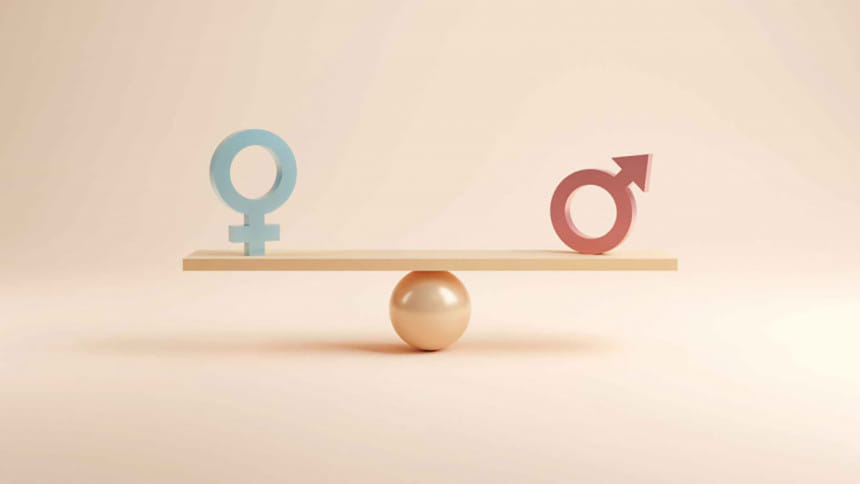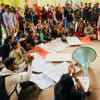Women do unpaid domestic work 8 times more than men: BBS

Women spend eightfold more time than men in domestic and care work, said a new survey of the Bangladesh Bureau of Statistics.
According to the "Time Use Survey 2021", men spend around 1.6 hours a day in domestic and care work while women do that for 11.7 hours which is nearly half of the day.
These works also do not meet the criteria of being productive, so these remain unpaid and unrecognised, the report said.
BBS published the survey report yesterday (June 13, 2022).
"Though domestic chores and care responsibility are the daily parcel to carry our future progress and should have been equally responsible for men and women, women seem to carry the burden," the report mentioned.
Besides carrying out the unpaid work, women also pass 1.2 hours performing productive work while men do the same for 6.1 hours, it said
As a result, men's work is five times more recognised than women's. This trend is observed despite one's sex, age, residence, education or marital status.
BBS conducted a pilot survey on "time use" in 2012. The national survey was conducted last year.
The main objective was to fill the void between unpaid domestic and care work and the national economy through better statistics.
The quantity of unpaid domestic work increases with age for women till 59 and then reduces for those aged above 60. For men, it gradually expands and never crosses the decimal point, the survey showed.
The report also said in terms of unpaid services for household and family members, women aged between 25-59 years spend 5.2 hours a day, whereas, men of the same age category spend 0.6 hours.
In urban areas, women spend 4.4 hours and men spend 0.6 hours a day for unpaid services and care for household and family members. It is respectively 4.7 hours and 0.6 hours for women and men in rural areas.
Also, in the case of unpaid household works and caring for family members, women with no formal education spend 4.1 hours a day, women with primary education spend 4.9 hours, women with secondary education spend 4.9 hours, and women with above secondary education spend 4.3 hours.
The survey also found that with marriage, more men join the employment-related activities and more women join unpaid domestic and care services.
It revealed that unmarried women and men spend 1.1 and 3.8 hours respectively in employment, while married women and men spend 1.2 and 6.8 hours, and widow or divorced or separated women and men spend 1.6 and 2.8 hours in employment respectively.
About 96.21 percent of houses surveyed use electricity.
Electricity is used by 99 percent of respondents from urban areas and 95.20 percent of respondents from rural areas, the survey also revealed.
The rest of the items considered in this context did not cross the decimal level except for the use of kerosene and paraffin in rural areas which is 1.17 percent and for urban areas it is 0.48 percent, and solar lantern which is 2.72 percent in the rural areas and 0.19 percent in the urbanity, the report revealed.
Some sources of fuel like firewood or dung need to be collected and prepared to use continuously when sources like LP gas, coal, kerosene, electricity, etc are not used.
So, the aforementioned users need to invest more time to collect the materials for cooking. It adds to the time spent on domestic work.
Firewood is used by 49.44 percent of the respondents, among them 32.52 percent in urban areas and 55.55 percent in rural areas.
Respondents who use dung, straw or shrubs are at 28.82 percent, including 9.29 percent in urbanity and 35.87 percent in rural areas.
Urban people (56.48 percent) use LP gas or natural gas nearly seven times more than rural people (8.37 percent).
In the evolution of communication systems, mobile phone is the latest. It gives its users a dormant sense of security as they will be able to be in touch with someone necessary in case of an emergency. It is also a basic route to access the necessary information.
The survey found 72.74 percent of respondents could afford a mobile phone. Women are behind men as only 59.92 percent of women had a mobile phone in comparison with 86.10 percent men, according to the survey.
The survey also found more men have access to the internet than women. A total of 28.06 percent of respondents use the internet. Among them, 35.15 percent are men and 21.25 percent are women.
The report also said "unpaid domestic work" or "unequal reproductive tax" is very unfair for all women.
Based on the data collected for this study, it has been revealed that unpaid domestic and care work affects almost all aspects of women's lives critically, irrespective of the women's economic status, family type, type of profession, number and age of children, level of education, among other things.
The issue of "unpaid domestic work" has a tremendous impact on women in the context of Bangladesh.
The gender gap, unequal distribution of unpaid care work and unequal distribution of time for doing these household chores have a significant impact on women's lives inside their families.
In the socio-economic context of a patriarchal country, doing the household chores to maintain the whole family is considered women's first and most important responsibility to fulfil, even if they are employed.
The survey recommended multipronged policies to address the needs of different categories of women in Bangladesh.
The survey revealed that care is an essential element of household and family life. The quality of care can ensure a sound family life, family relationship and social bonding.
All women are not equal contributors to care work but women in both classes are the sole agent of this work.
On the other hand, there are two groups of people who commonly needed extra care; children and aged people. The policymakers should consider separate measures for these two groups of people.
Gender equality cannot be attained in the absence of equal rights and women themselves have to be the active agents for this change, the report also read.
The exclusion of women in the labour market is unjustified and represents a vast economic and competitive loss for any society, it added.

 For all latest news, follow The Daily Star's Google News channel.
For all latest news, follow The Daily Star's Google News channel. 









Comments